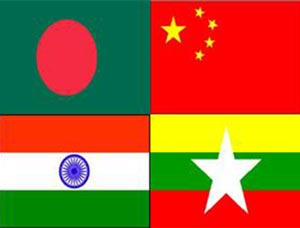During the 11th Bangladesh–China–India–Myanmar Forum for Regional Cooperation (BCIM) meeting in Dhaka the sub-regional organization of Asian nations urged governments to remove trade barriers. The BCIM called for greater economic cooperation in the region to reflect the fast-changing global and regional dynamics, and to promote multimodal connectivity through rail-road-water and air linkages within the region. The participating countries would gain significantly from the development of trade and transit corridors, according to a 12-point joint BCIM statement issued at the end the forum.
 The BCIM forum on Feb. 24 at BRAC Inn in Dhaka was hosted by Centre of Policy Dialogue (CPD) and included representatives from CPD Executive Director Mustafizur Rahman, Centre for Policy Research (India) Governing Body member Eric Gonsalves, Vice Governor of Yunnan Province in China Ju Kong and Myanmar Ambassador to Bangladesh U Myo Myint Than. The representatives signed the joint statement on behalf of their respective countries.
The BCIM forum on Feb. 24 at BRAC Inn in Dhaka was hosted by Centre of Policy Dialogue (CPD) and included representatives from CPD Executive Director Mustafizur Rahman, Centre for Policy Research (India) Governing Body member Eric Gonsalves, Vice Governor of Yunnan Province in China Ju Kong and Myanmar Ambassador to Bangladesh U Myo Myint Than. The representatives signed the joint statement on behalf of their respective countries.
The cooperation of the 4 countries is of the upmost importance for their respective economic growth and the world economy, according to Kazi Akram Uddin Ahmed, president of the Federation of Bangladesh Chambers of Commerce and Industry (FBCCI) who spoke at the forum. The BCIM represents 9 percent of the world’s land mass, 40 percent of the population and 7.3 percent of the global GDP.
“Trade between BCIM countries reached 4.5 percent in 2010, when it is over 35 percent between ASEAN countries…Developing transport connectivity, particularly multimodal system, is the key here,” according to Ahmed, who added that opportunities of reaping the benefits of good rail, water and road linkages within the region remain widely untapped.
According to Umesh Chowdhary, vice-chairman and managing director of the Indian company Titagarh Wagons “the multimodal transport system is necessary to explore new business corridors and opportunities”.
Rokia Afzal Rahman, president of Metropolitan Chamber of Commerce and Industry, said the BCIM countries can enhance their businesses manifold by using Bangladesh’s two ports — Chittagong and Mongla.
“This sub-region can be a potential business bloc,” said Rahman while urging India, China and Myanmar to invest in Bangladesh, which has abundance of cheap labor.
Li Ana, senior staff member of Yunnan Branch of China Council for the Promotion of International Trade, emphasized the need for promoting connectivity between the regional connectivity to boost trade and investment.
Myanmar Ambassador to Bangladesh U Myo Myint Than said, “with the help of the Dhaka Declaration there will be multi-track cooperation among countries of the BCIM region” that will “contribute to economic development in the region and help the member countries to attain higher GDP growth rate and accelerate poverty alleviation”.
Bangladesh Information Minister Hasanul Haq Inu said south Asian and neighboring countries need to overcome the dangers of poverty, communalism and nuclear weapons through strengthening the regional, sub-regional cooperation during his speech as the chief guest. Pointing out that these 3 issues are common bombs that are being hatched in the South Asia. The Information Minister stressed that the south Asia and its neighbors should move forward to tackle the challenges through better connectivity and cooperation.
The BCIM that originated in 1999 from an initiative by a number of institutions of the four participating countries, is inspired by an ambition to promote the cause of closer cooperation, according to United News of Bangladesh (UNB).



